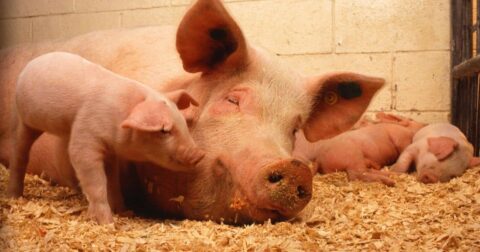Perspective
The Myth of the Cowboy and Its Enduring Influence on Public Policy
Meat Lobby•7 min read
News
In a 5-4 majority opinion, the Court upheld the rights of California voters to require pork sold in the state meet animal welfare requirements.

News • Legal Action • Policy

Words by Devatha P. Nair
The Supreme Court’s much-awaited decision on California’s Proposition 12 came this morning.
In a 5-4 majority opinion authored by Justice Neil Gorsuch, the Court upheld the rights of California to require pork sold in the state meet certain animal welfare requirements — specifically banning the use of gestation crates for pregnant pigs.
Notably, all nine justices rejected the National Pork Producers Council’s argument that Prop 12 is unconstitutional because it has indirect effects on pork producers beyond California — “virtually all state laws create ripple effects beyond their borders.”
Ultimately, the Court declined to overrule the will of California voters: “While the Constitution addresses many weighty issues, the type of pork chops California merchants may sell is not on that list.”
The Court also recognized a long history of states regulating animal welfare – dating back to the Massachusetts Bay Colony in 1641 and through today, as the state of Massachusetts now restricts forms of pig confinement in pork production.
“Mercy For Animals is overjoyed that the Supreme Court has affirmed the lower court’s dismissal of Big Agriculture’s lawsuit,” said AJ Albrecht, the organization’s Managing Director for the U.S. & Canada. “The outcome of this case supports the will of California voters and rejects the industry’s baseless arguments against Proposition 12. Today we celebrate that in the near future, countless pigs, calves and hens will no longer needlessly suffer the most extreme forms of confinement.”
Said Kitty Block, president and CEO of the Humane Society of the United States, of the decision, “It’s astonishing that pork industry leaders would waste so much time and money on fighting this commonsense step to prevent products of relentless, unbearable animal suffering from being sold in California.”
In a statement from Food and Water Watch, the group’s Legal Director Tarah Heinzen said, “Today’s high court ruling is a rightful victory for sustainable, humane farming against giant corporations that prioritize cost-cutting and profit margins over the environment, food safety and animal welfare. It is also a critical victory for the rights of states that seek to do better on those issues than some of their neighbors, or the country at large.”
According to reporting from the industry publication Meatingplace, Scott Hays, president of National Pork Producers Council, expressed disappointment with the decision and said that the group is still “evaluating…’to understand all the implications.'”
Said Hays to Meatingplace, “Allowing state overreach will increase prices for consumers and drive small farms out of business, leading to more consolidation.”
President and CEO of the North American Meat Institute Julia Anna Potts also told Meatingplace that the group is studying the decision, but stands opposed to the California law: “Prop 12 remains a costly burden to producers and provides no benefit to animals or consumers.”
This particular case is over, says Mercy’s Albrecht: “It was a nine to zero opinion on the meat industry’s primary claim.” What’s next then is California’s department of food and agriculture has to enforce the law, and there could be a fight over what that looks like, specifically whether pork farms should be able to “self-certify” their compliance with California’s animal welfare law.
Animal welfare groups will be watching, says Albrecht. “It behooves organizations like ours to not only keep advocating for the regulations to uphold the spirit of the ballot initiative, but also to ensure that there is enforcement.”
According to reporting from Meatingplace, California regulators have said that pork producers can “self-certify” that their meat is Prop 12-compliant. “NPPC worries they run the risk of falsely certifying compliance and distributing non-compliant pork, with the Prop 12 measure’s threat of civil and criminal penalties including jail time.”
California officials will need to take steps to ensure compliance, says Albrecht. “We really want state inspectors to have eyes on on all the pigs and how they’re being treated in particular,” she says. “We don’t think it’s appropriate for the industry to be its own watchdog.”
In 2018, Prop 12, also known as the Prevention of Cruelty to Farm Animals Act was passed with a convincing majority of 63 percent of California voters. Prop 12 only applies to the sale of animal-derived products from sows, veal calves and egg-laying hens in California and requires that the animals be maintained with minimal freedom of movement during their lifetime before they are slaughtered and processed for meat and dairy products.
Given heightened consumer awareness and concerns over animal welfare, Prop 12 is generally regarded as a move in the right direction by both animal activists and much of the animal agriculture industry. In addition to many producers in the veal and poultry industries, major pork producers such as Tyson Foods and Hormel have announced their intent to comply with Prop 12. As meat and dairy producers who prefer not to comply with Prop 12 are free to sell their products to the rest of the country, complying with Prop 12 is a choice that businesses can make, one in which customer concerns about animal welfare is heeded.
However, opponents of Prop 12, led by the National Pork Producers Council (NPPC) say that consumer concerns for animals raised for meat and dairy products should not take precedence over impacts on interstate commerce. The NPPC and its allies previously argued that Prop 12 will have a ‘massive, nearly apocalyptic impact’ on the over $28 billion dollar U.S. hog market.
“Our goal is to have the law overturned, and to also establish clear boundaries for any future propositions,” said Michael Formica, a chief legal strategist for the NPPC. Formica and his team fear that Prop 12 could set a precedent where animal welfare considerations are prioritized over commerce. Toward this end, they also sued the Massachusetts Attorney General to enjoin enforcement of a law that bans the sale of pork in Massachusetts from pregnant sows that were housed in individual pens pending the Supreme Court’s decision on Prop 12.
As the third largest pork producer in the world, U.S. pork continues to be a popular domestic food item with per capita consumption estimated to reach 52 pounds per year by 2031. An exhaustive study by the UC Davis Department of Agricultural and Resource Economics showed that the additional cost of Prop 12-compliant pork would be $8 per person, per year, which could be passed on to consumers in California with minimal changes to prices and outputs of the pork industry.
Besides, by attempting to bypass state laws and local ordinances whenever regulations economically inconvenience out-of-state industries, the Supreme Court would have been setting a highly dangerous precedent, pointed out Harvard’s Animal Law & Policy Program Legislative Policy Fellow Kelsey Eberly, who authored a 60-page report that catalogued the myriad, diverse state laws and local ordinances that would have been imperiled if the Supreme Court rules in favor of the pork producers.
Eberly went on to state, “the pork producers are asking the Supreme Court to strip states of their ability to not only ban cruel and unsafe products but also combat climate change, protect consumers from financial scams, and much more, whenever regulation economically inconveniences out-of-state industries. These arguments lack any foundation in the Constitution.”
A majority of the Court apparently agreed.
Now that Prop 12 has been upheld, the law will impact how pregnant sows, who can have up to three litters in a year, are confined during pregnancies. Sows in our food system are impregnated repeatedly and can undergo anywhere from four to 14 pregnancies before they are slaughtered for meat at three to four years of age.
Left unconfined, a pregnant sow, who can weigh up to 800 pounds, will turn around up to 200 times in a day. However, the narrow gestation crates in which sows are confined for 112-115 days at a stretch during each pregnancy are typically 14-16 square feet with no room to turn around.
Prop 12 ensures that pregnant sows have at least 24 square feet during pregnancies, paving the way for a more humane existence for a small fraction of the over six million breeding sows who spend their pregnancies in gestation crates in the U.S.
While the NPPC objects to the monetary costs that Prop 12 will impose on factory farms across the U.S., supporters of Prop. 12 have pointed out that smaller farms have been meeting Prop 12 standards and producing what is marketed as “humanely raised pork” for years without going bankrupt.
Besides, a large portion of the pork industry in the U.S. also sells ‘organic’ products under USDA guidelines that require ‘organic’ pigs to come from quarters where they are given “sufficient space” and “the freedom to lie down, turn around, stand up, fully.”
Allotting larger crates for sows whose litters are destined for California will not necessarily require a complete overhaul of the way factory farms are currently set up then. The pork industry already segregates and traces pork products under labels such as “no antibiotics” and “crate-free’ within existing facilities, which the Court noted in its opinion.
Despite its limitations, Prop 12 has been hailed as a landmark piece of legislation for its call for more humane treatment of animals trapped in our food systems.
The Court’s decision today is a watershed moment for such animals and the animal welfare advocates who have been pushing for better standards of confinement across the livestock industry — from cage-free egg production to bans on gestation crates in pork — as well as the California voters who overwhelmingly support these improvements.
This piece has been updated to include reactions from AJ Albrecht of Mercy For Animals, Kitty Block of Humane Society of the United States, Tarah Heinzen from Food and Water Watch, reporting from Meatingplace on industry response, to add more details on the decision and a more nuanced description of pork marketed as “humanely raised.”